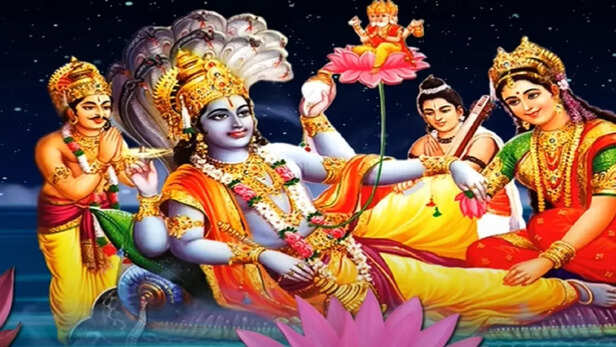Mukkoti Ekadasi 2025: Vaikunta Ekadasi Date, Significance, and Parana Detai
Nidhi | Jan 09, 2025, 10:21 IST
( Image credit : Timeslife )
Discover the spiritual essence of Vaikunta Ekadasi 2025, its profound significance, and detailed timings for this sacred Hindu observance. Learn about the rituals, mythological importance, and how devotees celebrate this day with utmost devotion.
Vaikunta Ekadasi, also referred to as Mukkoti Ekadasi, is one of the most significant and auspicious days in the Hindu calendar, especially for devotees of Lord Vishnu. Observed on the 11th day (Ekadasi) of the Shukla Paksha (waxing moon phase) in the month of Pausha, this sacred day marks a spiritual occasion to seek divine blessings, cleanse one’s soul, and strive for liberation (Moksha).

In 2025, Vaikunta Ekadasi will be observed on Friday, January 10, 2025. Here are the key timings for the observance:
Vaikunta Ekadasi has profound mythological and spiritual significance. According to Hindu scriptures, this day is believed to mark the opening of the “Vaikunta Dwaram” or the “Gates of Vaikunta,” Lord Vishnu’s divine abode. Passing through this celestial gate symbolizes liberation from the cycle of birth and death, offering eternal bliss in the presence of Lord Vishnu.
The day is also celebrated as Mukkoti Ekadasi in South India. The word “Mukkoti” means “three crores” in Telugu, representing the belief that 30 million celestial beings descend to Earth to witness and bless devotees observing the day with piety and devotion.
It is said that Lord Vishnu defeated the demon Muran on this day, signifying the victory of good over evil. Muran represents ignorance and ego, while Lord Vishnu’s victory symbolizes enlightenment and humility. Devotees believe that observing Vaikunta Ekadasi can help them overcome their inner demons and attain spiritual awakening.
Vaikunta Ekadasi is marked by a series of devotional activities, rituals, and austerities that elevate the spiritual consciousness of devotees:
Fasting is a central aspect of Vaikunta Ekadasi observance. Devotees abstain from consuming grains, beans, or certain vegetables, and some observe a Nirjala fast, refraining from food and water. The fast begins at sunrise on Ekadasi and ends with Parana on Dwadashi (the following day). The purpose of fasting is to purify the body and mind, enabling devotees to focus entirely on spiritual activities.
Many devotees stay awake the entire night, singing bhajans, chanting the Vishnu Sahasranama (the thousand names of Lord Vishnu), and reading scriptures like the Bhagavad Gita. This practice symbolizes vigilance against negative thoughts and a commitment to devotion.
Temples dedicated to Lord Vishnu, such as the Sri Ranganathaswamy Temple in Srirangam and the Tirumala Venkateswara Temple in Tirupati, conduct elaborate celebrations on Vaikunta Ekadasi. The highlight of these rituals is the opening of the “Vaikunta Dwaram,” a specially designated entrance that is believed to lead directly to Vaikunta. Passing through this gate is considered extremely auspicious and is believed to grant spiritual blessings.
Acts of charity, such as donating food, clothes, or money to the underprivileged, are encouraged on this day. These acts reflect the values of compassion and selflessness, which align with the teachings of Lord Vishnu.
Parana, or breaking the fast, is as important as the fasting ritual itself. It is essential to break the fast at the appropriate time on Dwadashi to complete the observance of Ekadasi correctly. Failing to perform Parana on time is considered a deviation from the prescribed rituals.
For Vaikunta Ekadasi in 2025, the Parana time is between 7:14 AM and 8:21 AM on January 11. Devotees should avoid breaking the fast during the Hari Vasara period (the first quarter of Dwadashi). Performing Parana during the recommended time ensures the observance is spiritually fulfilling.
Vaikunta Ekadasi is often regarded as a path to self-realization and divine grace. The spiritual benefits of observing this day include:

Lord Vishnu
( Image credit : Timeslife )
Date and Timings for Vaikunta Ekadasi 2025
- Ekadasi Tithi Begins: January 9, 2025, at 12:22 PM
- Ekadasi Tithi Ends: January 10, 2025, at 10:19 AM
- Parana Time (Breaking the Fast): January 11, 2025, between 7:14 AM and 8:21 AM
- On Parana Day, Dwadashi Ends: January 11, 2025, at 8:21 AM
Why is Vaikunta Ekadasi Celebrated?
The day is also celebrated as Mukkoti Ekadasi in South India. The word “Mukkoti” means “three crores” in Telugu, representing the belief that 30 million celestial beings descend to Earth to witness and bless devotees observing the day with piety and devotion.
It is said that Lord Vishnu defeated the demon Muran on this day, signifying the victory of good over evil. Muran represents ignorance and ego, while Lord Vishnu’s victory symbolizes enlightenment and humility. Devotees believe that observing Vaikunta Ekadasi can help them overcome their inner demons and attain spiritual awakening.
Rituals and Observances
1. Fasting (Upavasa)
2. Night Vigil (Jagaran)
3. Special Pujas and Temple Visits
4. Charity and Acts of Kindness
Significance of the Parana (Breaking the Fast)
For Vaikunta Ekadasi in 2025, the Parana time is between 7:14 AM and 8:21 AM on January 11. Devotees should avoid breaking the fast during the Hari Vasara period (the first quarter of Dwadashi). Performing Parana during the recommended time ensures the observance is spiritually fulfilling.
Spiritual Benefits of Vaikunta Ekadasi
- Liberation (Moksha): Devotees believe that observing Vaikunta Ekadasi can free them from the cycle of birth and death, granting eternal bliss in the presence of Lord Vishnu.
- Cleansing of Sins: The austerities and prayers performed on this day are believed to absolve past sins and purify the soul.
- Spiritual Growth: Fasting, prayers, and acts of kindness help devotees transcend material desires and focus on their spiritual journey.
- Divine Blessings: Lord Vishnu’s grace is said to bring prosperity, happiness, and fulfillment of righteous desires.
